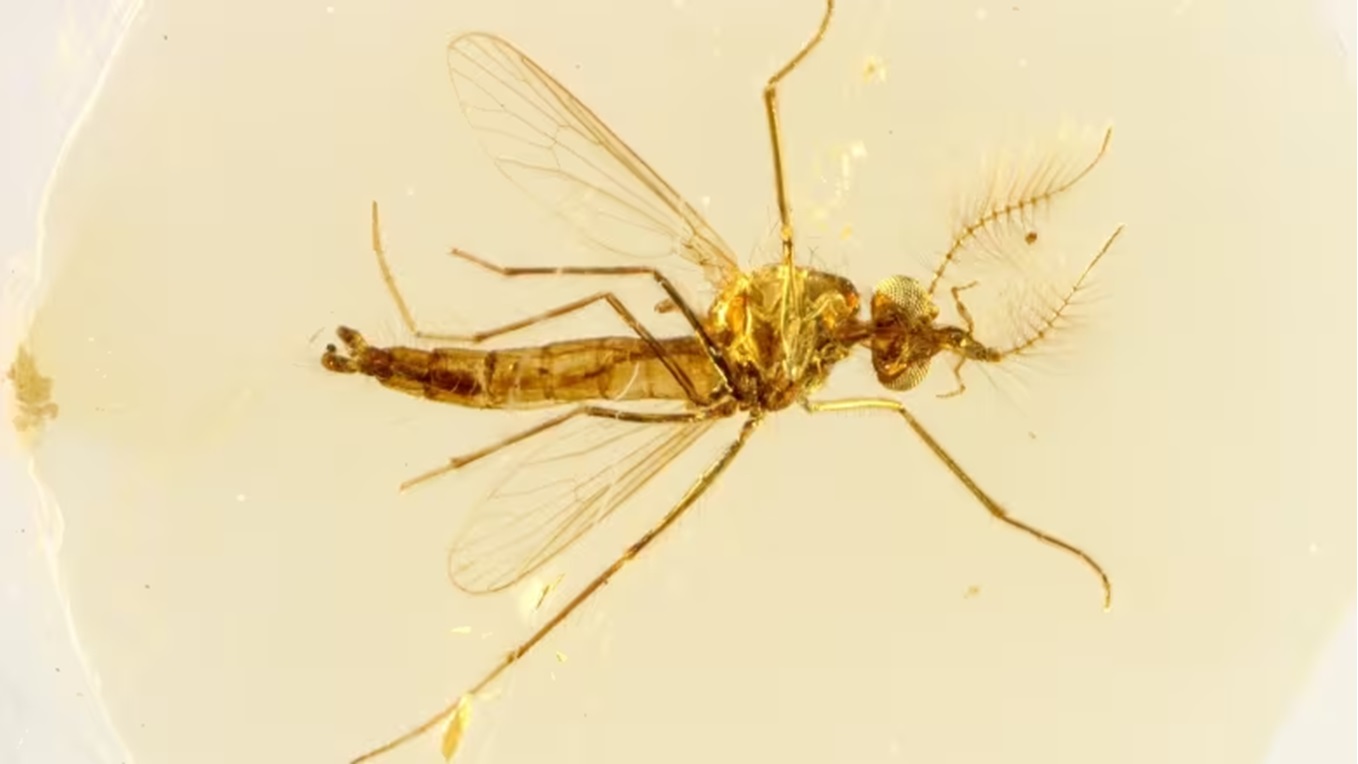
A recently released image, provided without a specific date, displays an aerial perspective of a preserved male mosquito fossilized in amber. This discovery took place in central Lebanon and is estimated to date back approximately 130 million years, as per the information shared by Dany Azar via Reuters.
Every year, malaria and other mosquito-borne diseases claim the lives of hundreds of thousands of people worldwide. Mosquitoes, ancient insects dating back to the age of dinosaurs, play a key role in transmitting these diseases. Strikingly, all these disease-spreading mosquito bites are carried out by females, distinguished by specialized mouth anatomy absent in their male counterparts.
However, a recent discovery has shed light on an unexpected twist in the evolutionary history of mosquitoes. Researchers have unearthed the oldest-known mosquito fossils, specifically two male mosquitoes preserved in pieces of amber dating back 130 million years to the Cretaceous Period. Found near Hammana in Lebanon, these male mosquitoes possess elongated piercing-sucking mouthparts typically observed only in modern female mosquitoes.
Paleontologist Dany Azar, affiliated with the Chinese Academy of Sciences' Nanjing Institute of Geology and Paleontology and Lebanese University, leads the study published in the journal Current Biology. Describing the findings, Azar noted the significance of the discovery, stating, "Clearly they were hematophagous," indicating a blood-eating behavior. This revelation challenges conventional understanding and represents a major milestone in the evolutionary timeline of mosquitoes.
Despite similarities in size and appearance to contemporary mosquitoes, the fossilized mosquitoes exhibit shorter mouthparts for blood acquisition compared to their present-day female counterparts. Mosquitoes are notorious for feeding on the blood of humans and other vertebrates, transmitting parasites and diseases in the process.
Azar explained the unique feeding habits of mosquitoes, emphasizing that only fertilized female mosquitoes require blood for egg development. In contrast, males and unfertilized females primarily consume nectar from plants, while some males abstain from feeding altogether.
Surprisingly, the Cretaceous Period fossils show hematophagous behavior in males, a trait absent in modern mosquitoes. The researchers speculate that mosquitoes likely evolved from non-blood-consuming insects. They propose that the specialized mouthparts initially adapted for blood meals were originally used to pierce plants for nutritious fluids.
Plant evolution and the emergence of flowering plants during the Cretaceous Period may have influenced the feeding divergence between male and female mosquitoes. The researchers believe that hematophagy, or bloodsucking, evolved from plant liquid-sucking behaviors in mosquitoes.
The study suggests that the earliest-known mosquitoes were all hematophagous, regardless of gender, and this behavior was later lost in males, possibly due to the proliferation of flowering plants coinciding with the formation of Lebanese amber. The fossils depict a time when various animals, including dinosaurs, pterosaurs, reptiles, birds, and mammals, provided ample blood meals for mosquitoes.
While these fossils represent the oldest-known mosquitoes, molecular evidence suggests mosquitoes originated millions of years earlier during the Jurassic Period. With over 3,500 mosquito species globally, the insects are found everywhere except Antarctica, serving as disease vectors for malaria, yellow fever, Zika fever, dengue, and other illnesses.
Despite the negative impact on human health, mosquitoes also play a role in environmental balance by purifying water in ponds, lakes, and rivers, showcasing the dual nature of these ancient insects.















